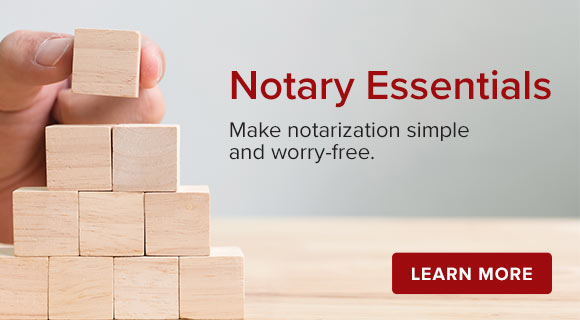
Updated 4-23-24. Completing a Notary certificate records and certifies what was done in performing your notarization.
The wording or language in a Notary certificate is an essential part of the notarial act itself because it officially records and describes the details of the notarization. Custom wording drafted by a signer or wording from another state might not comply with your state’s requirements. While the language used to convey these details varies from state to state and form to form, it should contain certain specific elements.
The 4 Ws of the notarial certificate
To figure out what you’re supposed to do, take a close look at the wording. Ideally, every notarial certificate should answer four key questions: where, who, when and what?
- WHERE means the location where you notarize the document. The certificate should include the words “State of…” and “County of…” at the beginning of the certificate. This is often referred to as the venue.
- WHO means the person whose signature you’re notarizing. Most Notary certificates will contain a blank space to insert the signer’s name.
- WHEN means the date you perform the notarization. A Notary certificate should contain a space to enter the date of notarization.
- WHAT refers to the type of notarial act you’re being asked to perform. Look for key words: the word “acknowledged” usually refers to an acknowledgment; the words “sworn” or “affirmed” can indicate a jurat or verification on oath or affirmation.
In addition to answering the “4 Ws”, make sure there is a line for your official Notary signature and space for you to affix you Notary seal — if required.
There are exceptions to the 4 Ws. For example, some oath/affirmation certificates do not include a venue. Make sure to familiarize yourself with your state’s Notary requirements and guidelines.
Out-of-state Notary certificates
If the Notary certificate comes from another state, you may wonder whether you can complete it. As a general rule, you may complete an out-of-state certificate as long as the wording complies with your state’s laws and it doesn’t ask you to do something you are not allowed to do.
There are exceptions. California Notaries, for example, are required by law to use specific certificate language exactly as it appears in statute for both acknowledgments if the document will be filed in California, and for all jurats regardless of where the document is filed. California also requires all acknowledgment, jurat and proof of execution certificates to include a boxed consumer notice above the venue that states the Notary is only identifying the document signer and is not verifying the truthfulness, accuracy or validity of the document.
Florida Notaries must ensure that any acknowledgment and jurat certificate contains nine elements prescribed in statute:
- The venue stating the location of the notarization in the format “State of Florida, County of ________”;
- The type of notarial act performed, whether an oath or acknowledgment, as evidenced by the word “sworn” or “acknowledged”;
- A statement that the signer either personally appeared in the physical presence of the Notary at the time of notarization or appeared via audiovisual technology at the time of notarization;
- The true date of the notarial act;
- The name of the person whose signature is being notarized (“It is presumed, absent such specific notation by the notary public, that notarization is to all signatures.”);
- The specific type of identification the Notary is relying on in identifying the signer, either based on personal knowledge or satisfactory evidence;
- The Notary’s official signature;
- The Notary’s name — typed, printed or stamped below the signature;
- The Notary’s official seal affixed below or to either side of the Notary’s signature.
Texas law states, “The traditional notary public shall attach a notarial certificate to all written notarial acts that names the principal, the date of the notarization, the state and county in which the notarization is performed, and the type of notarial act performed. The notarial certificate shall be signed and include an impression of the notary’s seal” (1 TAC 87.40[c]).
You should also know that some states, such as Georgia, don’t require specific certificate wording in their statutes.
Hybrid Notary certificate wording
In some cases, a Notary certificate will combine wording for more than one type of notarization in the same certificate. This is often called a “hybrid certificate.” An example of hybrid wording is, “Acknowledged, subscribed and sworn to before me on (date).”
Keeping in mind what we said earlier about out-of-state certificates, with the example of the hybrid certificate above, you should perform a jurat or verification upon oath or affirmation. Why? Because the wording indicates you must administer an oath and watch the principal sign the document in your presence. An acknowledgment generally does not require you to do either.
Two certificates
A document for the purchase of real property may contain two certificates: one for the buyer, and one for the seller. If both the buyer and seller are at the signing table, you would complete the first certificate for the buyer and the other for the seller. In this case, you are performing two notarizations, and you would record each notarization in your journal separately.
No notarial wording
What if the document doesn’t contain a Notary certificate? In general, you can’t perform the notarization without one. You’ll need to have the signer tell you which notarial act to perform or find out which one the document needs. Then you may complete and attach a separate certificate form with the appropriate notarial wording.


Related Articles:
How to fill out a Notary certificate
Avoid common Notary certificate mistakes
5 steps to a proper notarization
Additional Resources:
Tips & Tutorials
NNA Hotline